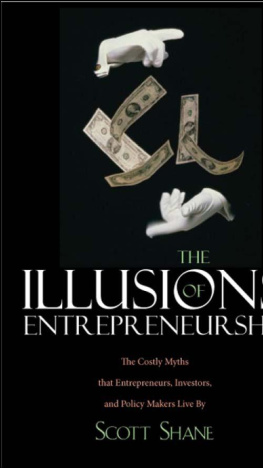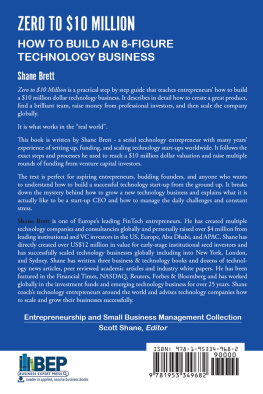Scott A. Shane - The Illusions of Entrepreneurship
Here you can read online Scott A. Shane - The Illusions of Entrepreneurship full text of the book (entire story) in english for free. Download pdf and epub, get meaning, cover and reviews about this ebook. year: 2008, publisher: Yale University Press, genre: Business. Description of the work, (preface) as well as reviews are available. Best literature library LitArk.com created for fans of good reading and offers a wide selection of genres:
Romance novel
Science fiction
Adventure
Detective
Science
History
Home and family
Prose
Art
Politics
Computer
Non-fiction
Religion
Business
Children
Humor
Choose a favorite category and find really read worthwhile books. Enjoy immersion in the world of imagination, feel the emotions of the characters or learn something new for yourself, make an fascinating discovery.
- Book:The Illusions of Entrepreneurship
- Author:
- Publisher:Yale University Press
- Genre:
- Year:2008
- Rating:3 / 5
- Favourites:Add to favourites
- Your mark:
- 60
- 1
- 2
- 3
- 4
- 5
The Illusions of Entrepreneurship: summary, description and annotation
We offer to read an annotation, description, summary or preface (depends on what the author of the book "The Illusions of Entrepreneurship" wrote himself). If you haven't found the necessary information about the book — write in the comments, we will try to find it.
The Illusions of Entrepreneurship — read online for free the complete book (whole text) full work
Below is the text of the book, divided by pages. System saving the place of the last page read, allows you to conveniently read the book "The Illusions of Entrepreneurship" online for free, without having to search again every time where you left off. Put a bookmark, and you can go to the page where you finished reading at any time.
Font size:
Interval:
Bookmark:

The Illusions of Entrepreneurship
Scott A. Shane
The Illusions of
Entrepreneurship
The Costly Myths That
Entrepreneurs, Investors,
and Policy Makers Live By
Yale University Press/New Haven & London
Copyright 2008 by Yale University.
All rights reserved.
This book may not be reproduced, in whole or in part, including illustrations, in any form (beyond that copying permitted by Sections 107 and 108 of the U.S. Copyright Law and except by reviewers for the public press), without written permission from the publishers.
Designed by Mary Valencia. Set in Century Old Style type by Technologies N Typography.
Printed in the United States of America.
Library of Congress Cataloging-in-Publication Data
Shane, Scott Andrew, 1964-
The illusions of entrepreneurship : the costly myths that entrepreneurs, investors, and policy makers live by / Scott A. Shane.
p. cm.
Includes bibliographical references and index.
ISBN 978-0-300-11331-0 (cloth : alk paper)
1. Entrepreneurship. 2. New business enterprises. 3. Success in business. I. Title.
HB615.S478 2007
658.11dc22 2007027402
A catalogue record for this book is available from the British Library.
The paper in this book meets the guidelines for permanence and durability of the Committee on Production Guidelines for Book Longevity of the Council on Library Resources.
10 9 8 7 6 5 4 3 2 1
To Lynne, Ryan, and Hannah
Contents
I decided to write this book after having a series of conversations with would-be entrepreneurs, students, government officials, and representatives of major foundations that support economic development activity. While each of these conversations was focused on a different topic, and each had a different purpose, they all had a common theme. The people I spoke with consistently expressed very inaccurate perceptions of what entrepreneurship in America really looks like. Whether they were referring to the number of people who start businesses, how new businesses are typically financed, who starts companies, or the economic impact of start-ups, my counterparts made statement after statement that was factually incorrect.
As a professor, I find it difficult to let incorrect information pass unchallenged, so I asked, Where did you learn that? The answers were varied: in a book, in a white paper, in an article, on the Web. It seemed that no matter where people looked for information about entrepreneurship, much of what they were getting was incorrect. It was then that I realized that I needed to write a book that accurately describes what entrepreneurship, as undertaken by the typical entrepreneur, looks like.
Writing this book turned out to be more difficult than I expected. Not only were there many incorrect statements floating around the Web and in articles in the mainstream press, but many ideas academics had about entrepreneurship turned out to be inconsistent with the facts. In fact, several of my own beliefs turned out to be wrong when I took a careful look at the data.
The result was that my efforts to come up with the answers presented in this book required me to look through many more data sources, articles, and books than I had originally thought necessary. But the effort was worth it. From the process, I learned a lot about entrepreneurship myself, as well as discovering the work of several obscure academic and government researchers who had figured out the right answers to many of the questions about entrepreneurship that most of us have wrong.
I am indebted to the authors of the surveys, research projects, and books and articles that gathered and summarized the answers I present here. While many people were valuable sources for the answers contained in this book, several stand out: Zoltan Acs, Tim Bates, David Blanchflower, Andrew Burke, Arnie Cooper, Marc Cowling, Robert Fairlie, Douglas Holtz-Eakin, Paul Reynolds, and Mark Taylor. The research projects these people conducted, and the books and articles they wrote were crucial to my effort to provide the information about the reality of entrepreneurship.
Writing this book also required me to gain access to sources of data with which I was unfamiliar. I would like to thank several people who helped me to gain access to and analyze these data, in particular Jon Eckhardt, Rob Fairlie, Brian Headd, Ying Lowery, and Paul Reynolds.
My work on this book was helped immensely because I had the great fortune of serving as the principal investigator on the Kauffman Firm Survey, a national probability sample of businesses founded in the United States in 2004. In addition to having access to the data from this survey, I had the opportunity to work with Alyse Freilich of the Kauffman Foundation and with Janice Ballou, Dave DesRoches, and Frank Potter of Mathematica Policy Research, Inc. I learned a great deal about researching entrepreneurship by working with them.
Over the years, a number of my colleagues have taught me a great deal about the topics discussed in this book. Howard Aldrich, Per Davidsson, Frederic Delmar, Jon Eckhardt, Bill Gartner, Dave Hsu, and Nicos Nicolaou stand out as particularly important. My colleagues at Case Western Reserve University, particularly Sue Helper and Jim Rebitzer, generously gave their time to discuss many of the ideas in this book with me. This book would not have been possible without their help.
Nicos Nicolaou, Frederic Delmar, Bill Gartner, and Dave Hsu read and commented on the entire draft of the book. Their comments were invaluable in helping me to refine my arguments. My editor, Michael OMalley, went over the manuscript with a surgeons precision. His insightful comments helped me to clarify key points in the book.
Lastly, I would like to thank my wife Lynne, daughter Hannah, and son Ryan, each of whom helped me as I worked on this book, Hannah and Ryan by being excellent playmates when I needed breaks from writing, and Lynne by encouraging and supporting my efforts to create this book.
Entrepreneurship is one of the most popular topics of our time. If you enter the word entrepreneur into the Google search engine, you will get more than 76,500,000 hits. This is far more than the 43,800,000 you will get if you search another popular keywordsex. Clearly there is a lot of information out there about entrepreneurship. Yet, here I am, adding another book to the mix. Why?
The reason is that we are surrounded by myths about entrepreneurship. When I say myths, you probably know what I mean: theres the story about the penniless high-school dropout who comes to America with $10 in his pocket and starts a construction company that makes him a multimillionaire, or theres the one about the engineers who invent an Internet phone, get some venture capital, and build a billion-dollar company.
Most people like these myths. Some of them appeal to our love of the heroic, like the Horatio Alger stories that describe people who overcome great odds to become successful. Others appeal to our sense of voyeurism, giving us a window on a life that seems exciting and exotic. And because we like hearing these myths, we tell them and retell them, and write them down in articles and books. When people write books and articles recounting these myths, other people buy them, leading to a self-perpetuating cycle of more authors writing down similar myths.
The result of all this telling and retelling is that myths about entrepreneurship pervade all kinds of media, from television to radio to newspapers to the World Wide Web. Millions of Web pages, tens of thousands of books, and hundreds of thousands of articles about entrepreneurship tell the stories of the meteoric growth of start-up companies. Television and the radio profiles describe entrepreneurs, the businesses they start, and the impact they have, all in ways consistent with our myths.
Font size:
Interval:
Bookmark:
Similar books «The Illusions of Entrepreneurship»
Look at similar books to The Illusions of Entrepreneurship. We have selected literature similar in name and meaning in the hope of providing readers with more options to find new, interesting, not yet read works.
Discussion, reviews of the book The Illusions of Entrepreneurship and just readers' own opinions. Leave your comments, write what you think about the work, its meaning or the main characters. Specify what exactly you liked and what you didn't like, and why you think so.












